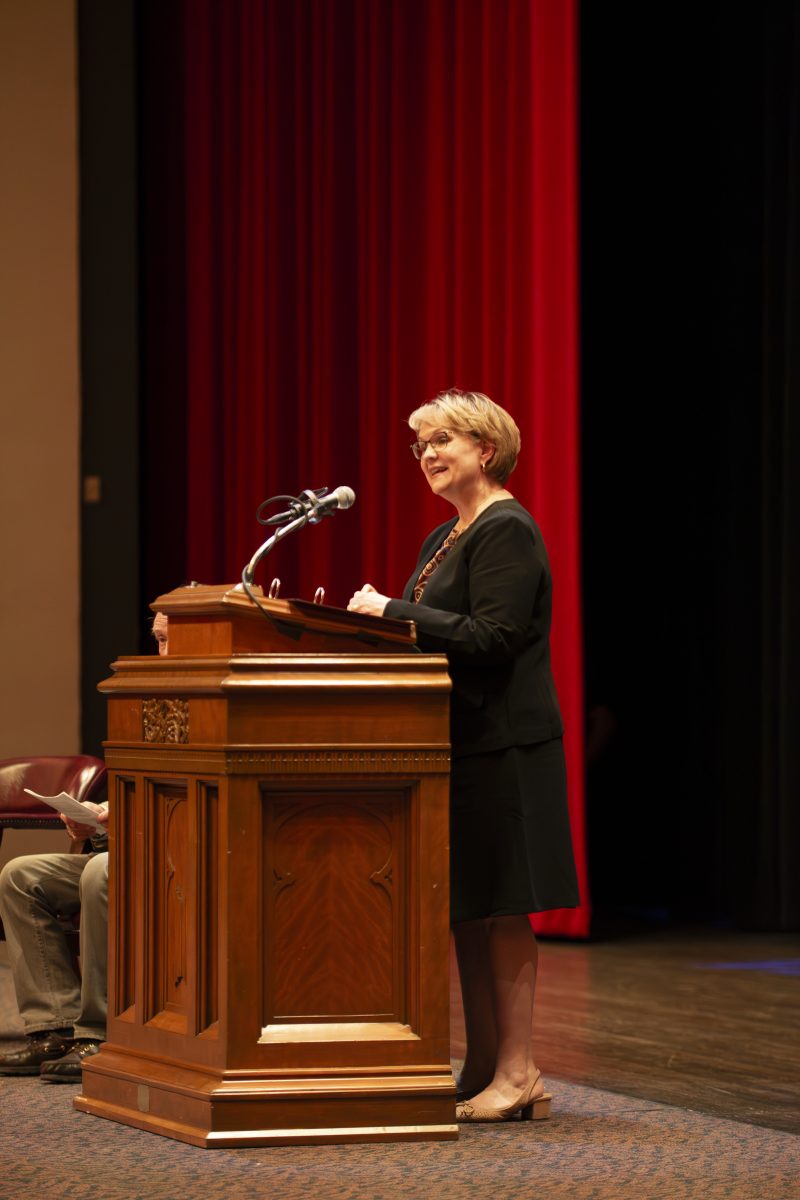Admiral James Stavridis, Ph.D.-holding Navy veteran and author, spoke at Trinity’s 13th annual Maverick Lecture: “Beyond the Horizon: 21st Century Global Security and Risk” on Nov. 1 in Laurie Auditorium.
During the Maverick Lecture, Stavridis spoke about geopolitics and leadership, beginning with a survey of critical challenges around the world, including those occurring in the Middle East, Ukraine and China. He then discussed ideas for leadership in such conflicts, including everything from building intellectual capital to adjusting our military capability for the 21st century.
Stavridis currently serves as international analyst for NBC, MSNBC and CNBC and travels to conventions giving public speeches about global affairs. Formerly, he was the dean of The Fletcher School at Tufts University. He has also published 12 books, one of which is listed under the New York Times bestseller list, hundreds of articles, columns for “Bloomberg” and he also gave a TED Talk on global security in 2012.
“Each of us has a role to play in international security issues. And frankly, you may not be interested in the world, but I assure you the world is interested in you,” Stavridis said. “As citizens of the world’s leading democracy, we should all learn about global challenges and consider what we can do to help solve some of these intractable problems.”
After Stavridis served for 37 years in the Navy as a four-star admiral and supreme allied commander of NATO, it was clear to him that he wanted to pursue a life of service. Stavridis believes there is a crucial need for effective communication, so his work is about sharing facts and opinions with a larger audience and is a key element to solving hard, worldly problems.
“Throughout all those four decades, it was clear to me that if we are going to solve the really big problems, we have to think and work together,” Stavridis said. “After all, not one of us is as smart as all of us thinking together.”
Bruce Bravo, senior director for conferences and special programs, and Wiliam Scalan, partner in the law firm of Schoenbaum, Curphy & Scanlan, helped select Stavridis for the Maverick Lecture.
“This is my favorite part of what I do at Trinity. Not only do I get to meet these people, but [I get] to hear these people speak,” Bravo said. “He is a speaker whose timing is just right, talking about topics most people are concerned about right now: ‘What’s going to happen to the rest of the world?’”
The William and Salomé Scanlan Foundation, which supports Hispanic cultural initiatives and educational, environmental and human rights, funds the Maverick Lecture series. The lecture series began in 2007 to promote civil liberties, dialogue and discourse, honoring late civil rights lawyer Maury Maverick Jr. by exploring topics that defined his role in American civic discourse. Bravo wants lectures like Stavridis’ to educate the public, especially on political issues.
“I hope they learn what is happening in the Middle East, and I hope they understand that they are getting a message from a man who has incredible knowledge of the area and how it all comes together,” Bravo said.
Bravo wants students and community members to attend and gain a new perspective on global conflicts. Sarah Solis, senior political science and history double-major, introduced Stavridis for the student question and answer session in Northrup Hall.
“It’s not every day you get to ask a retired Admiral and Supreme Allied Commander questions, so I hope students take advantage of that,” Solis said. “It’s important because the focus of the Admiral’s lecture is to explain what role the United States plays in global security — getting to the heart of why we are involved in the ongoing Ukraine war and the Israeli-Palestinian conflict.”
Stavridis hopes people leave the auditorium energized and concerned about the challenges ahead in the international world. He wants people to explore information about places like Iran, the South China Sea and Ukraine.
“I hope they take a cautious sense of optimism about the way forward in this complex world,” Stavridis said.









